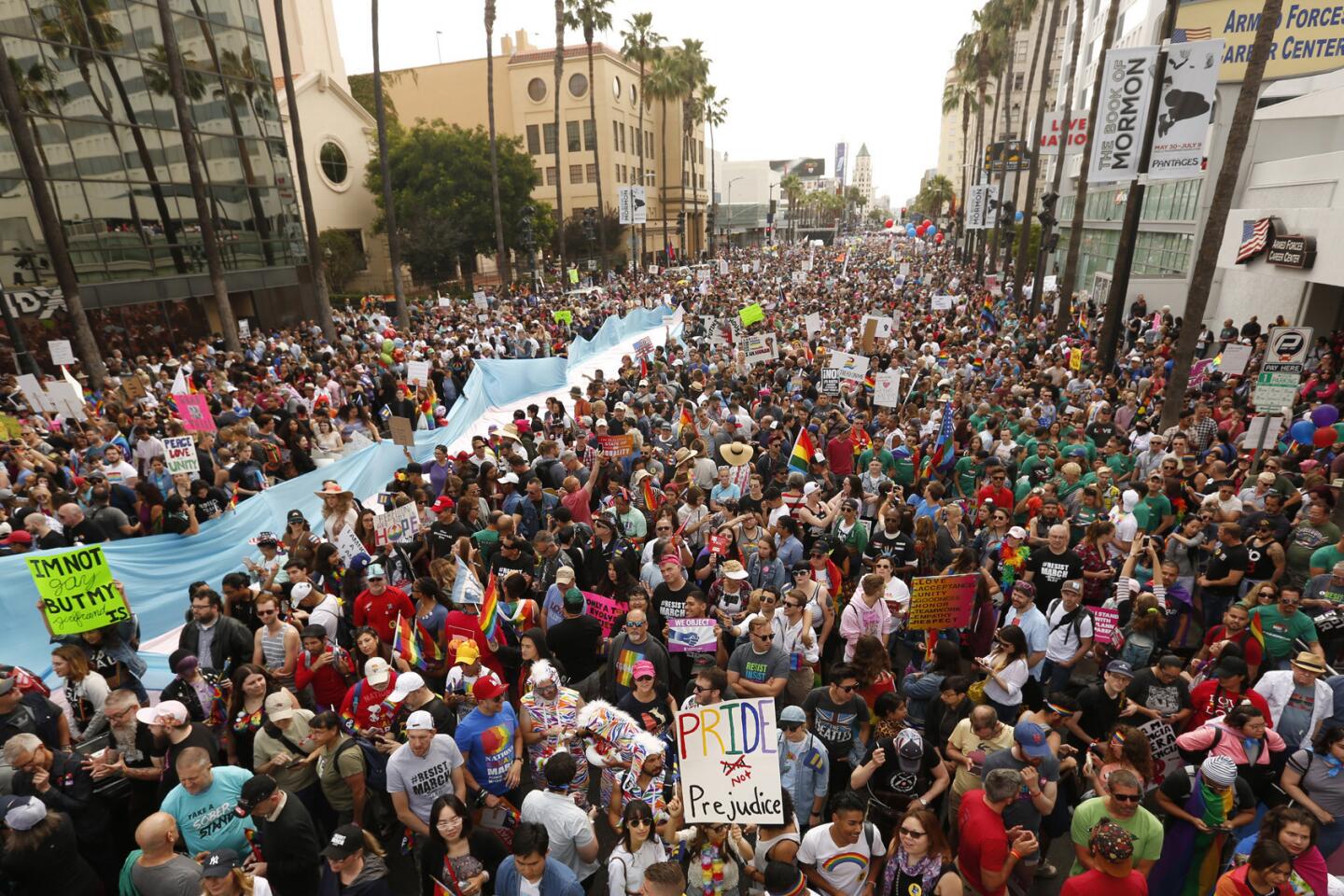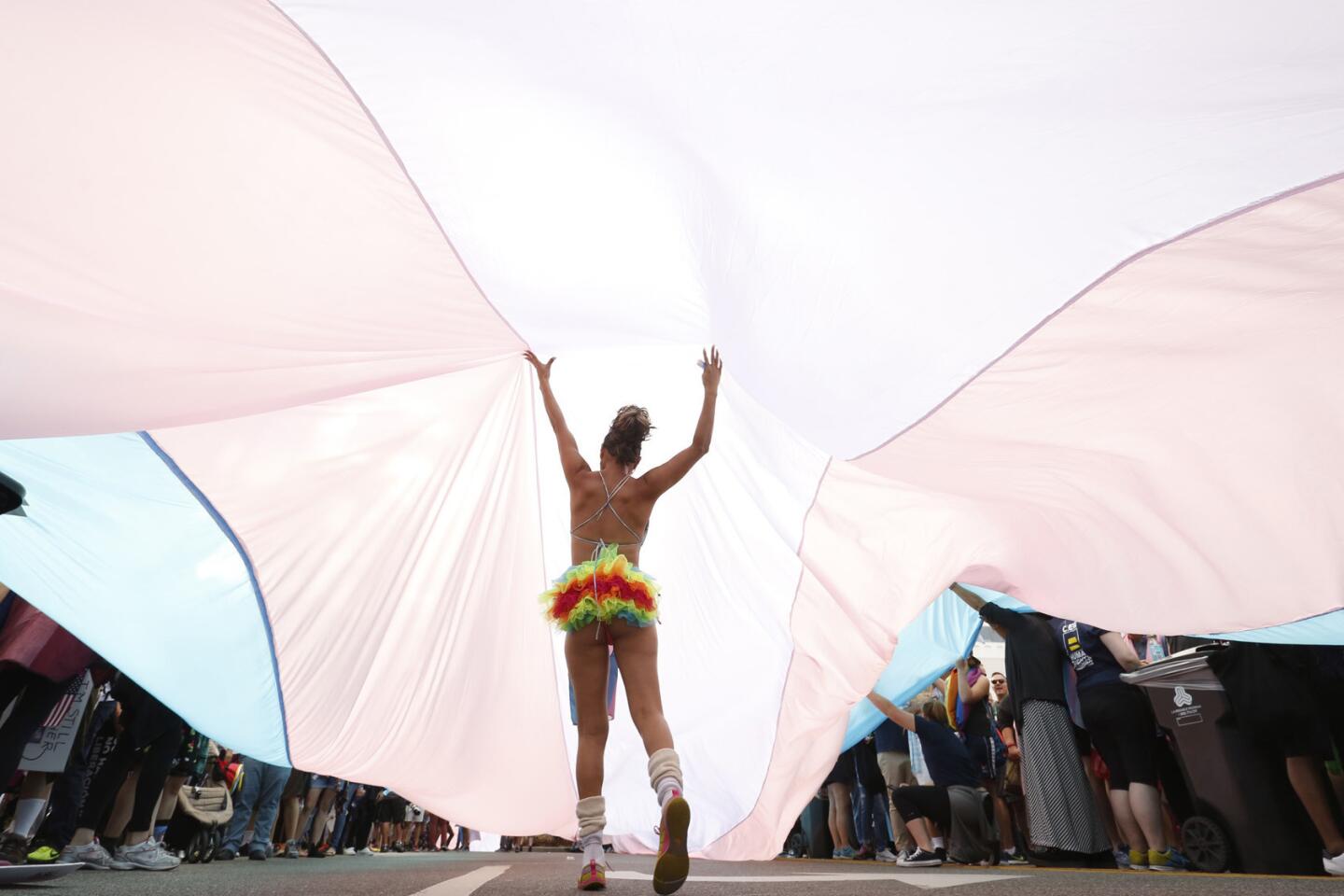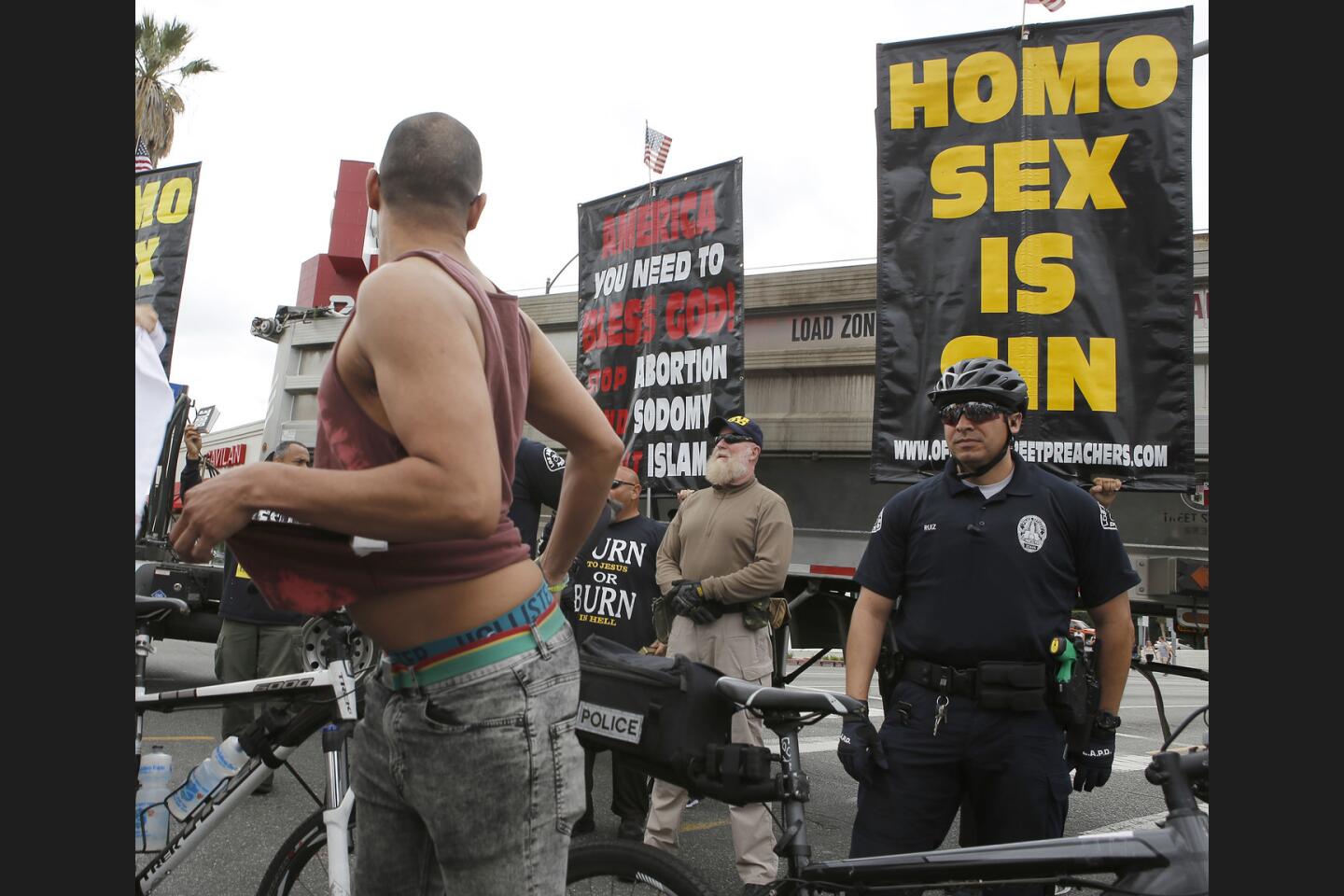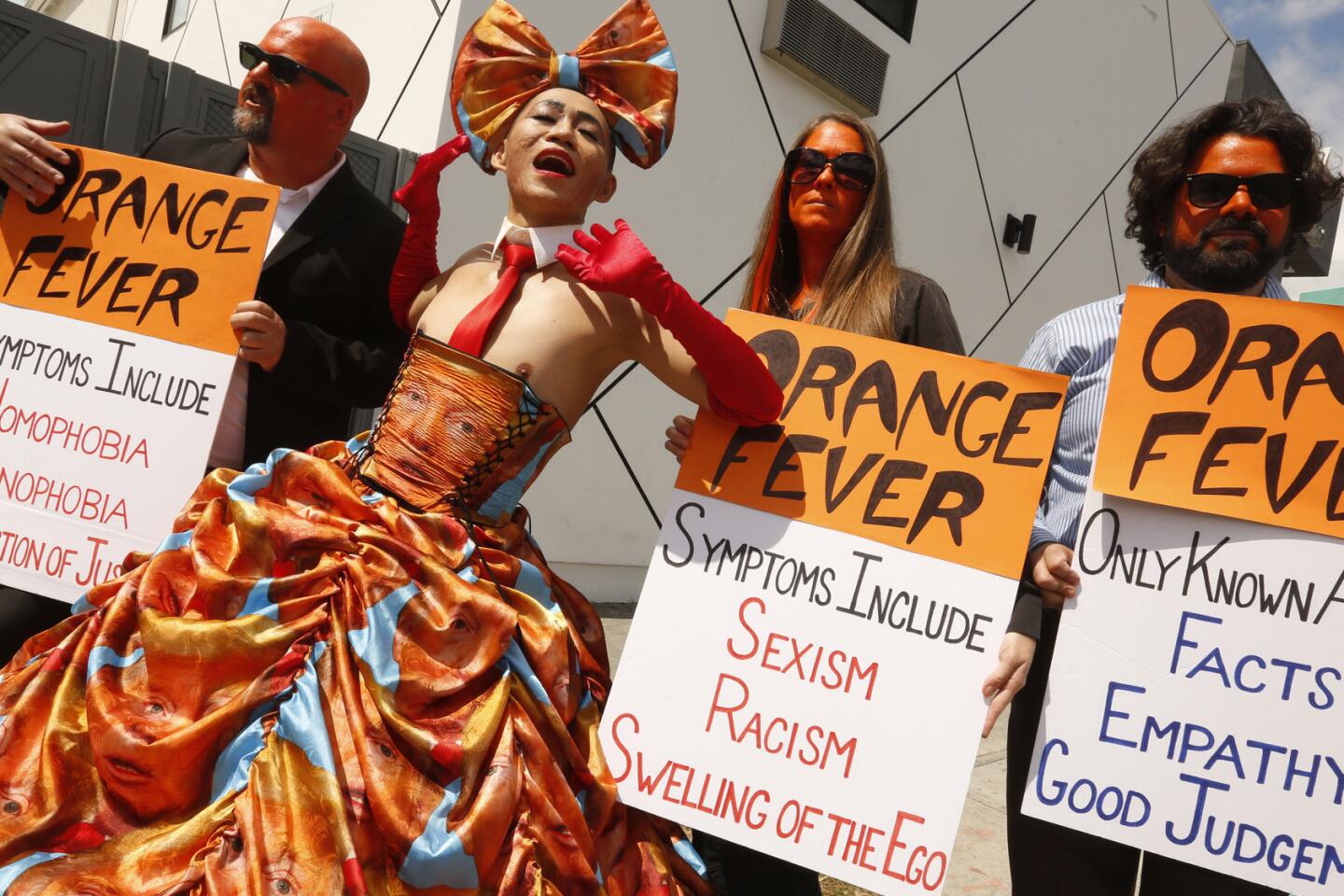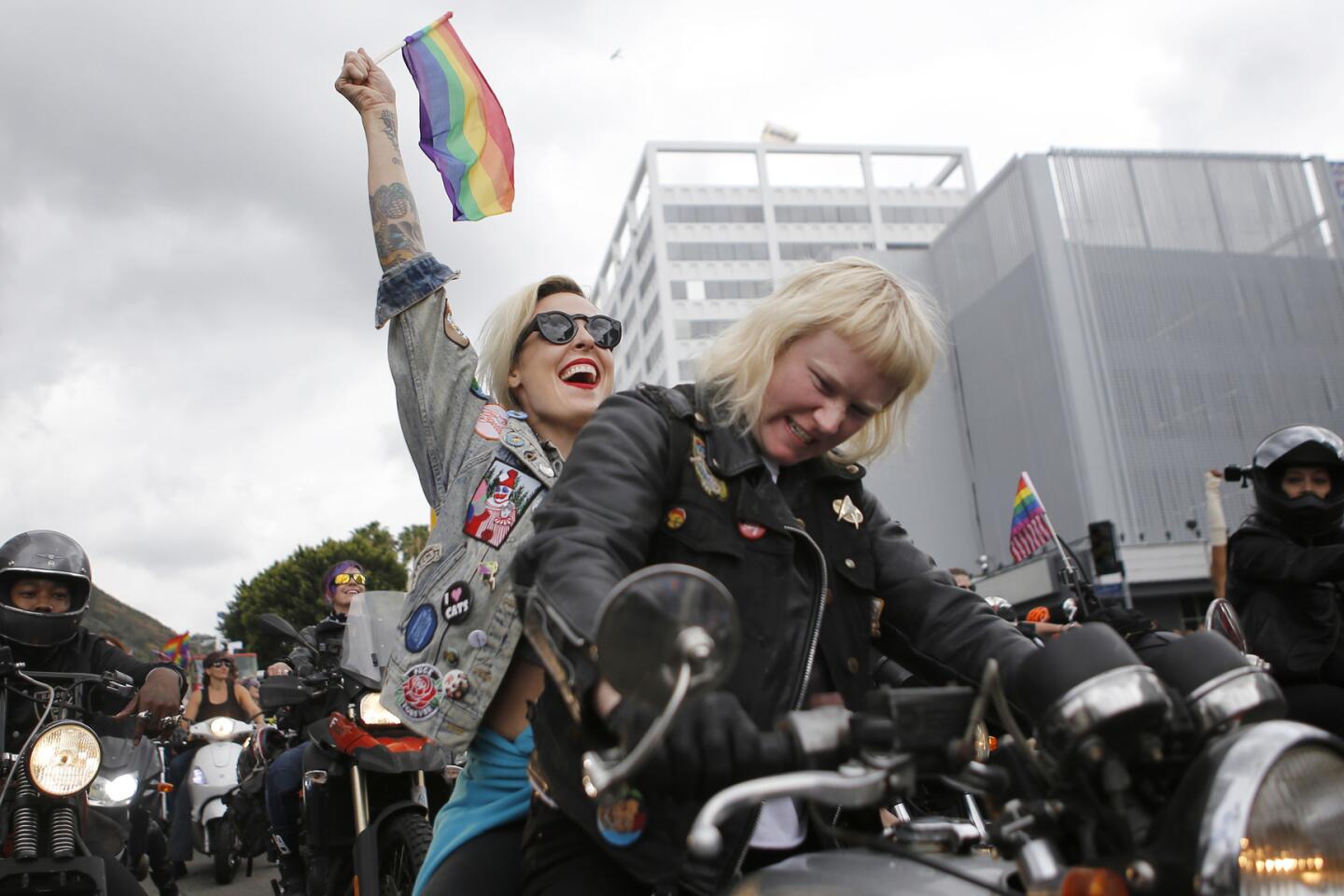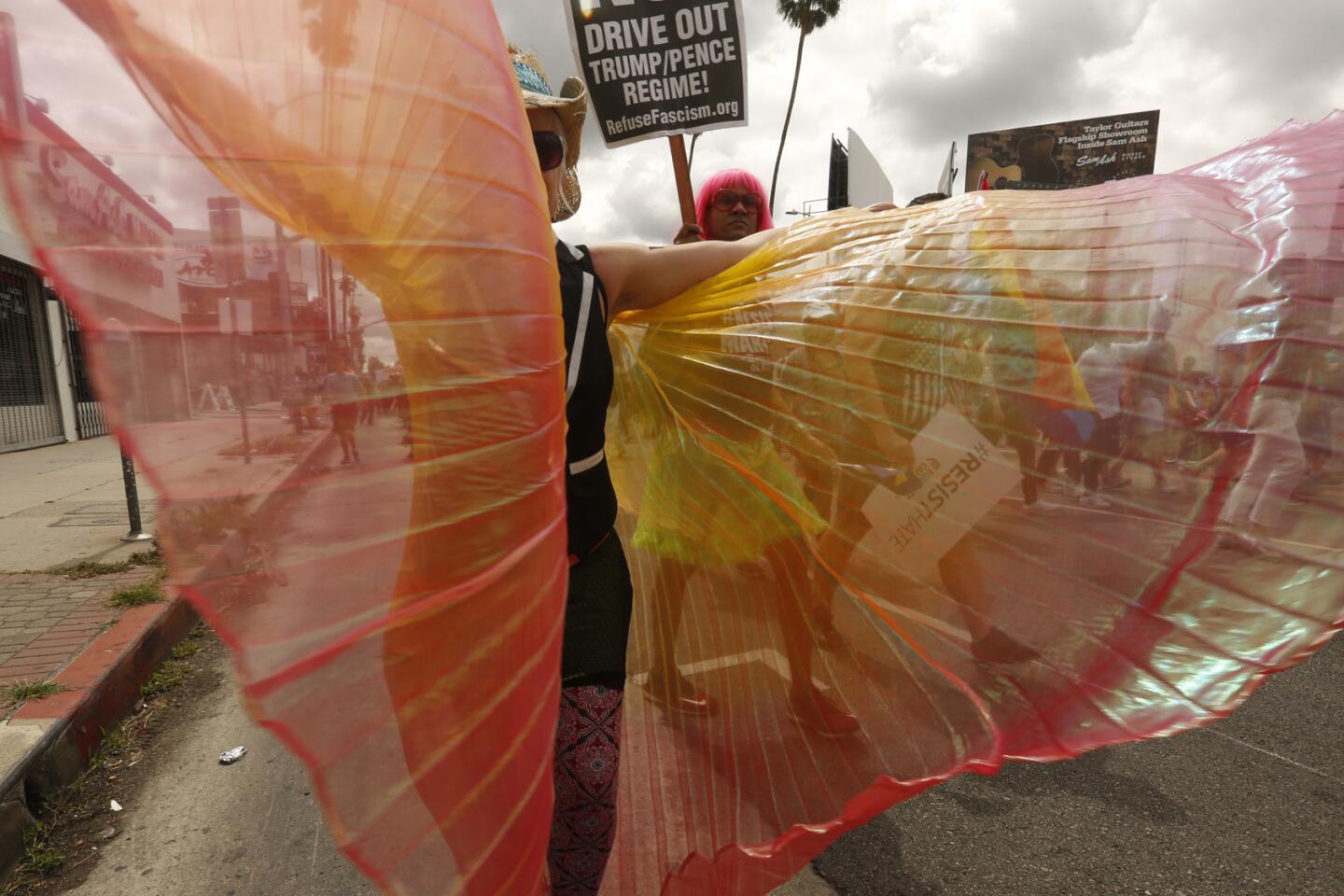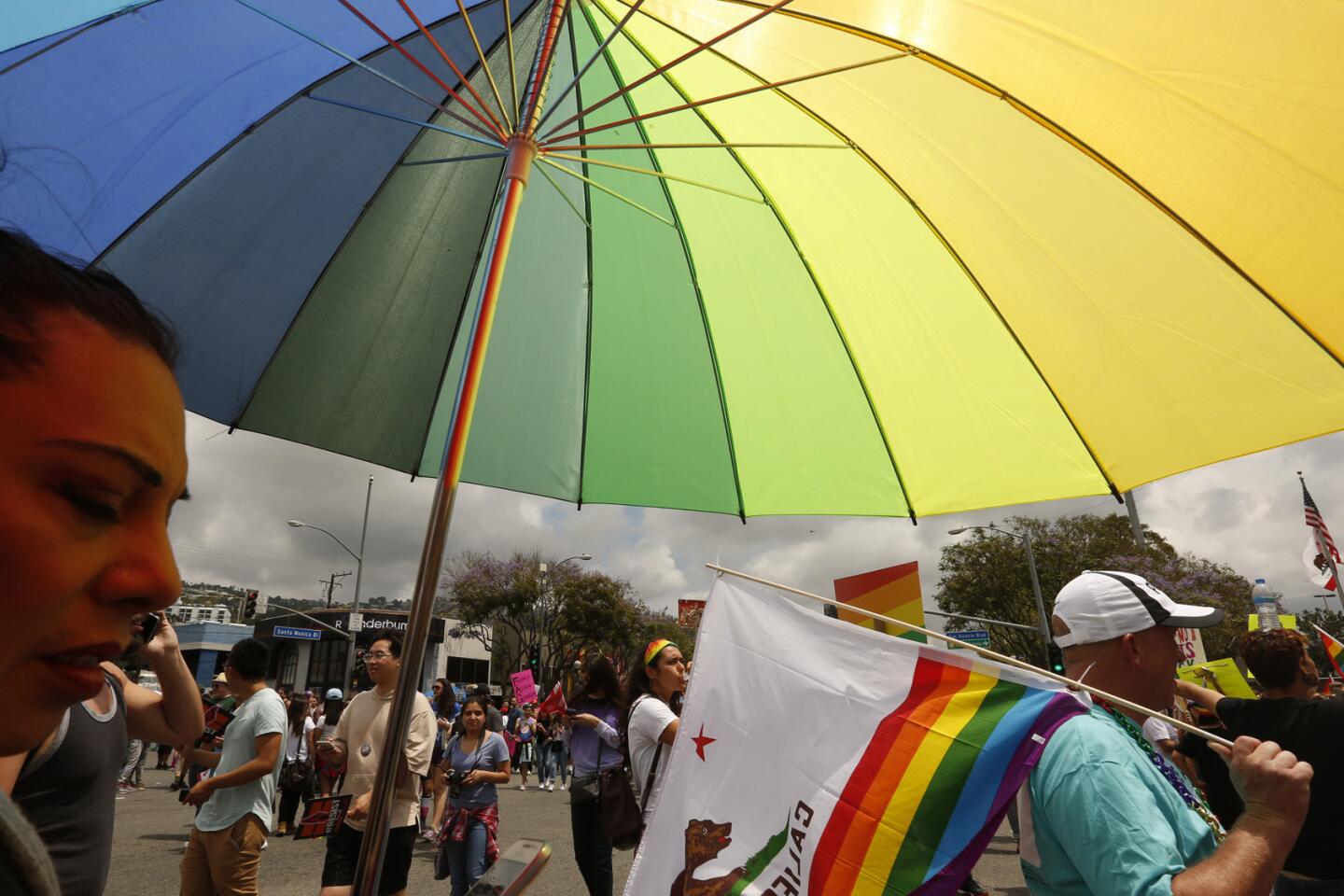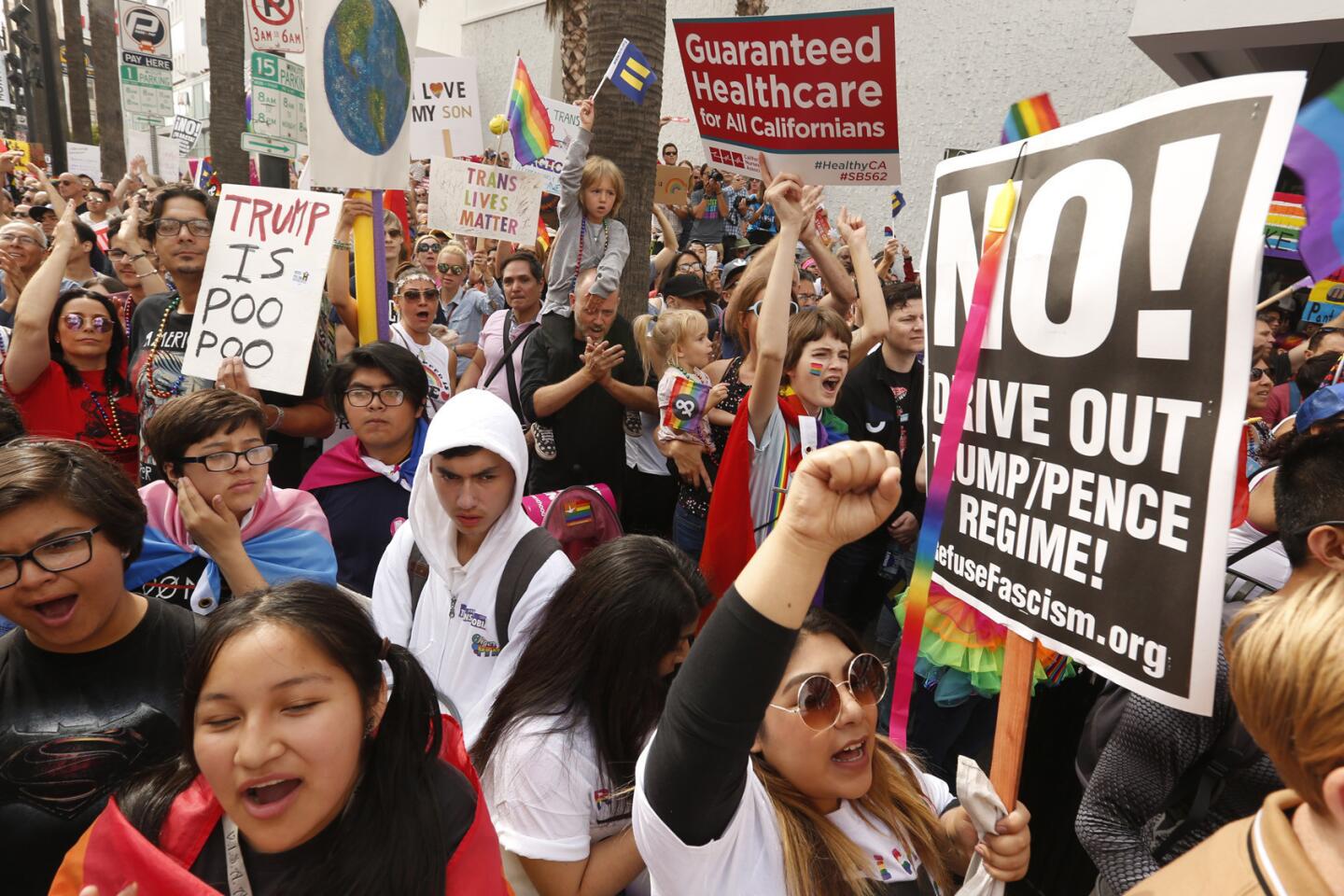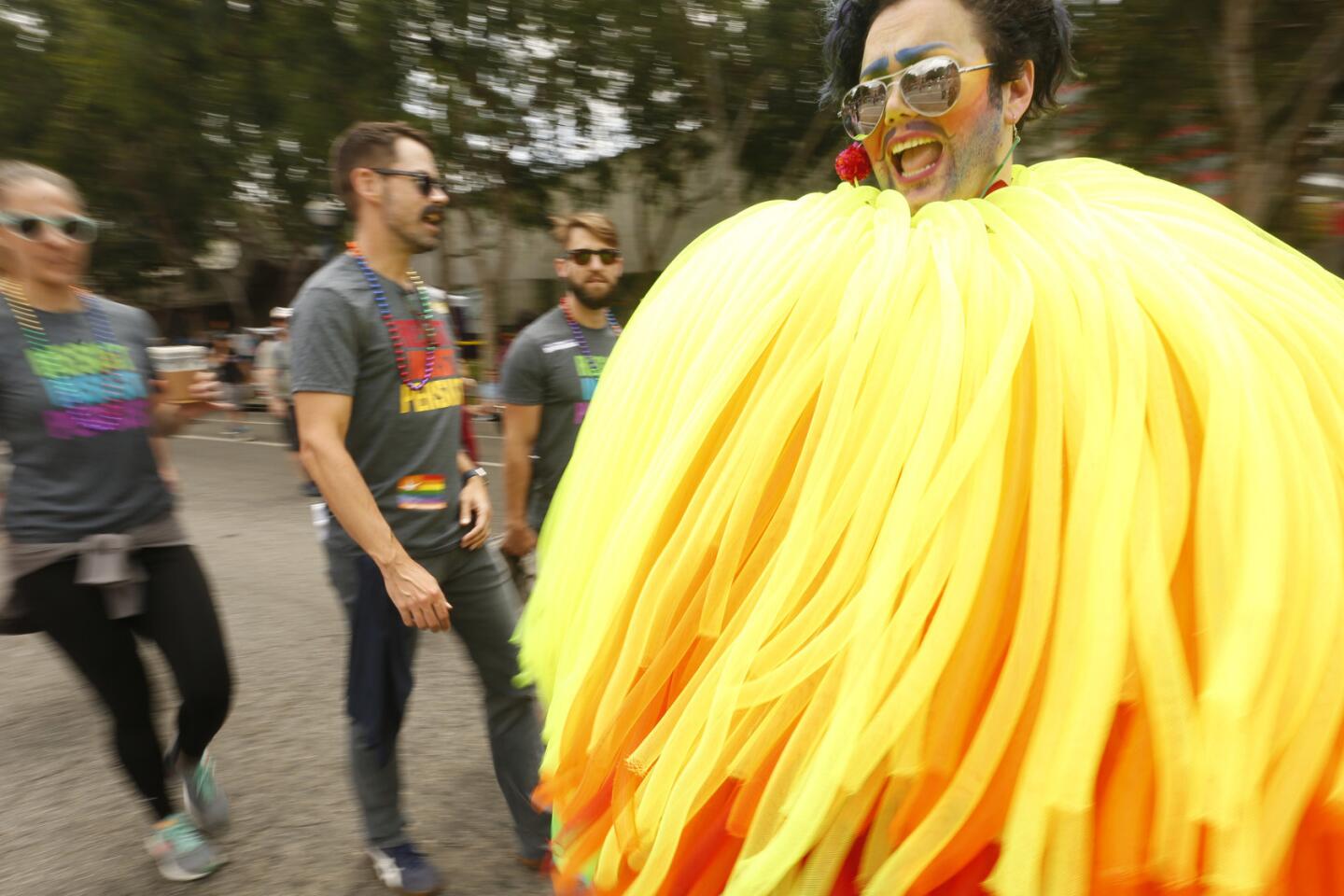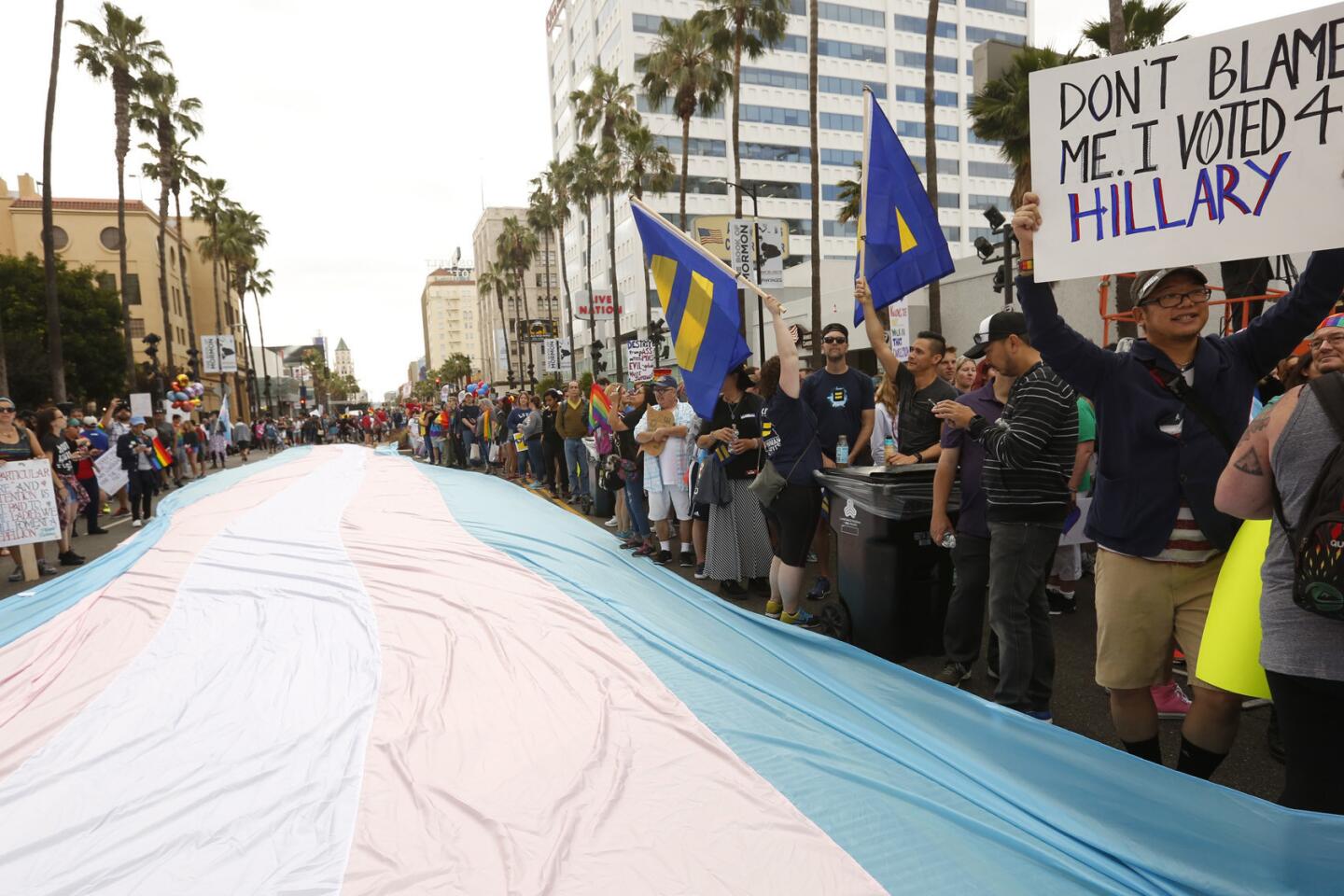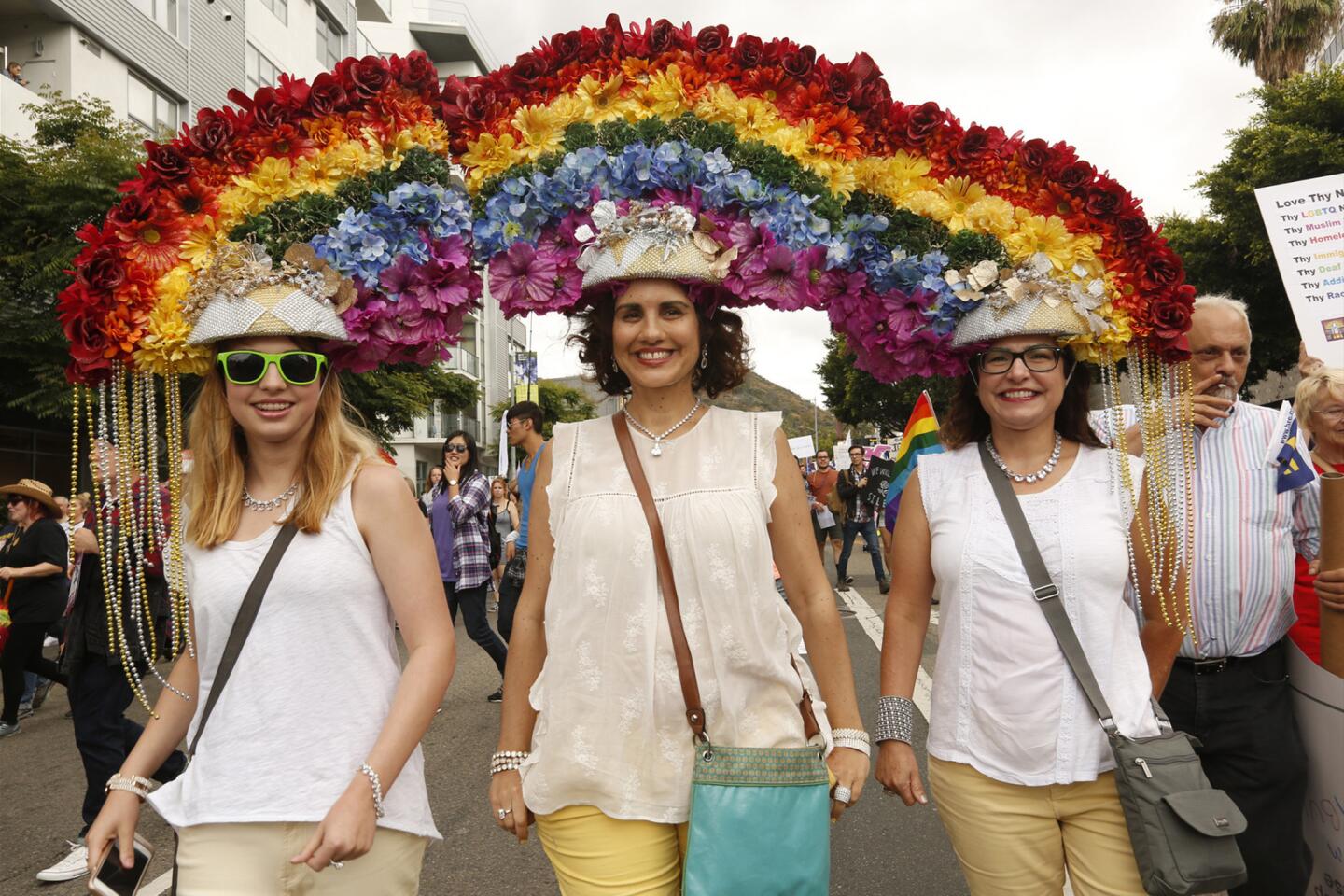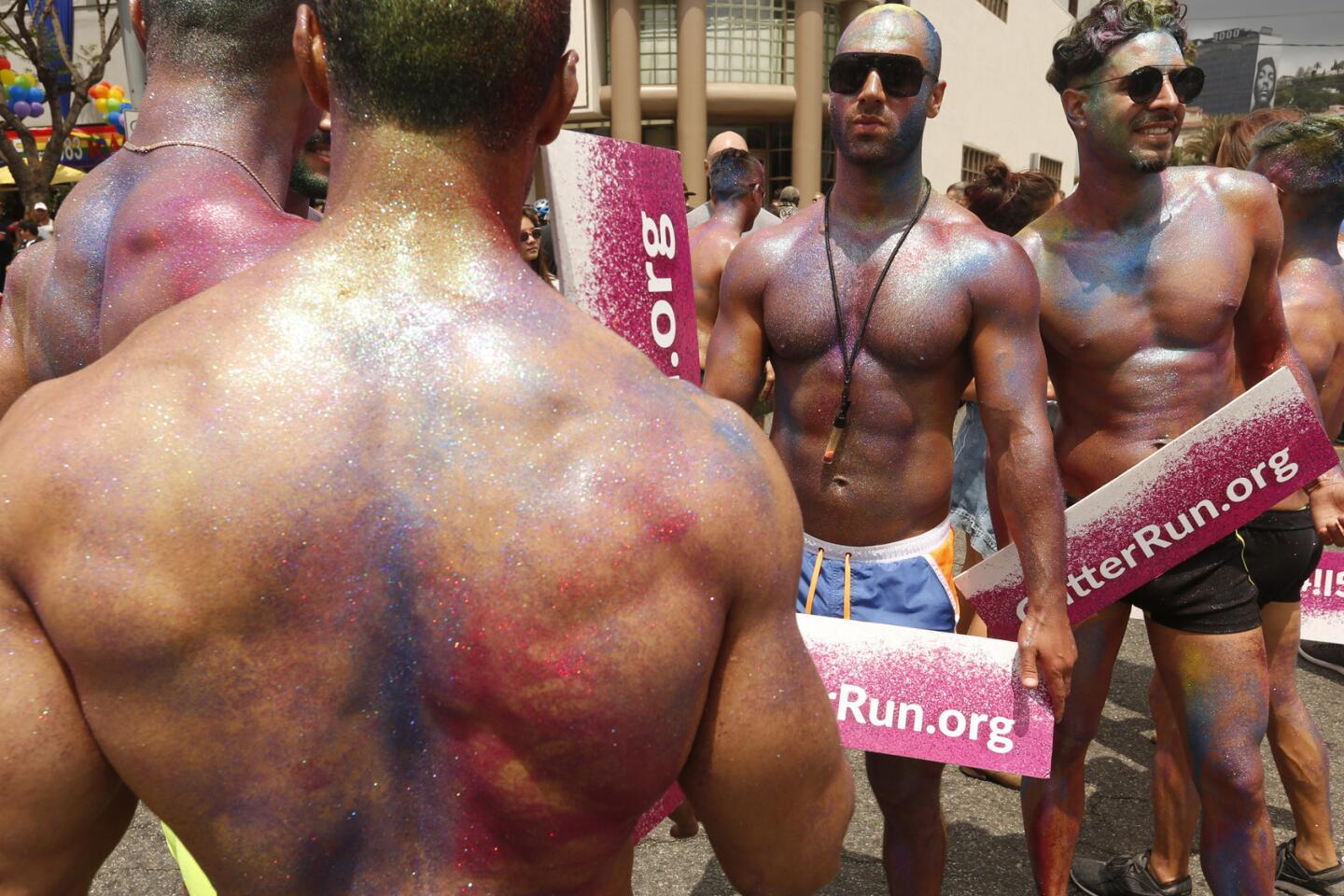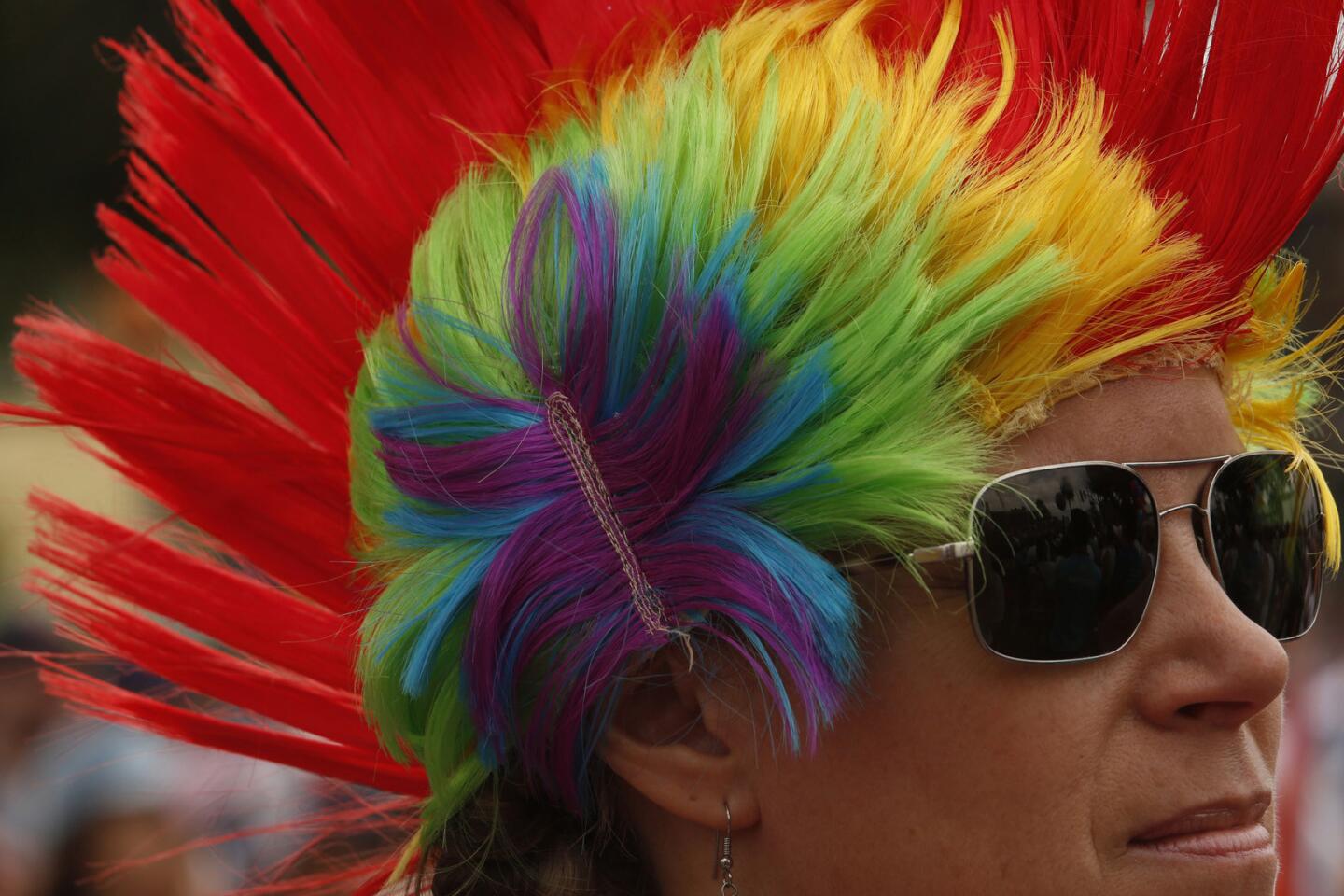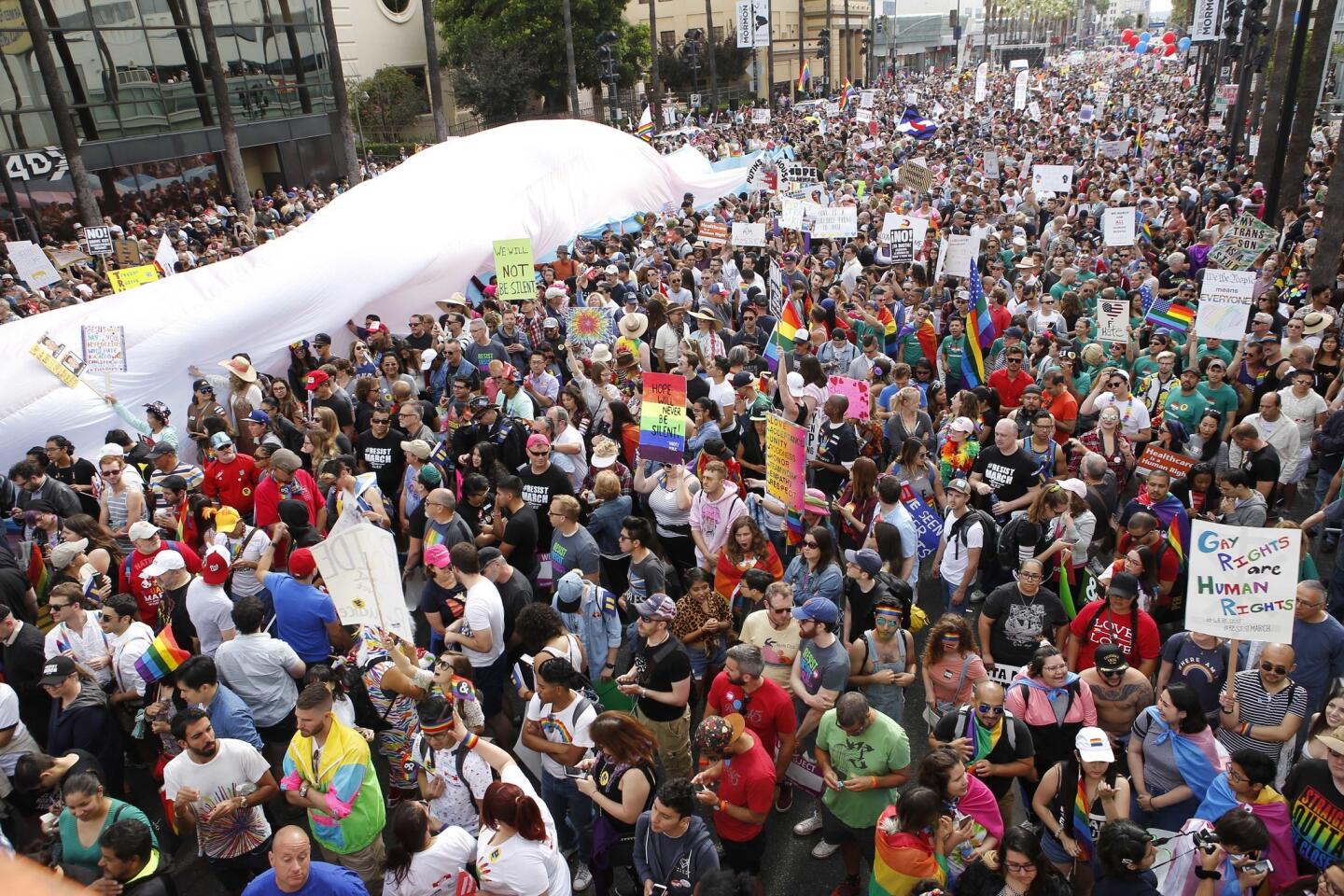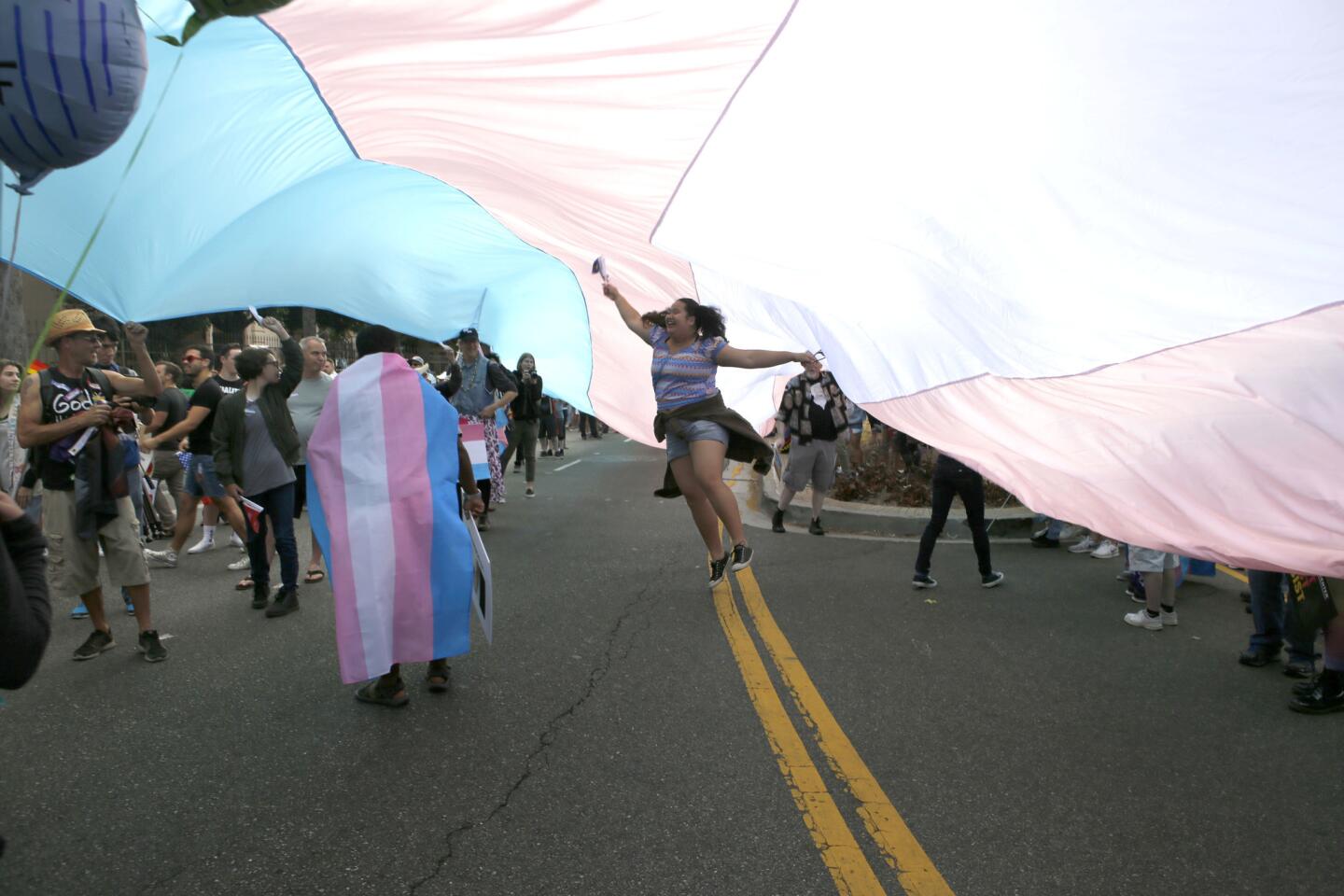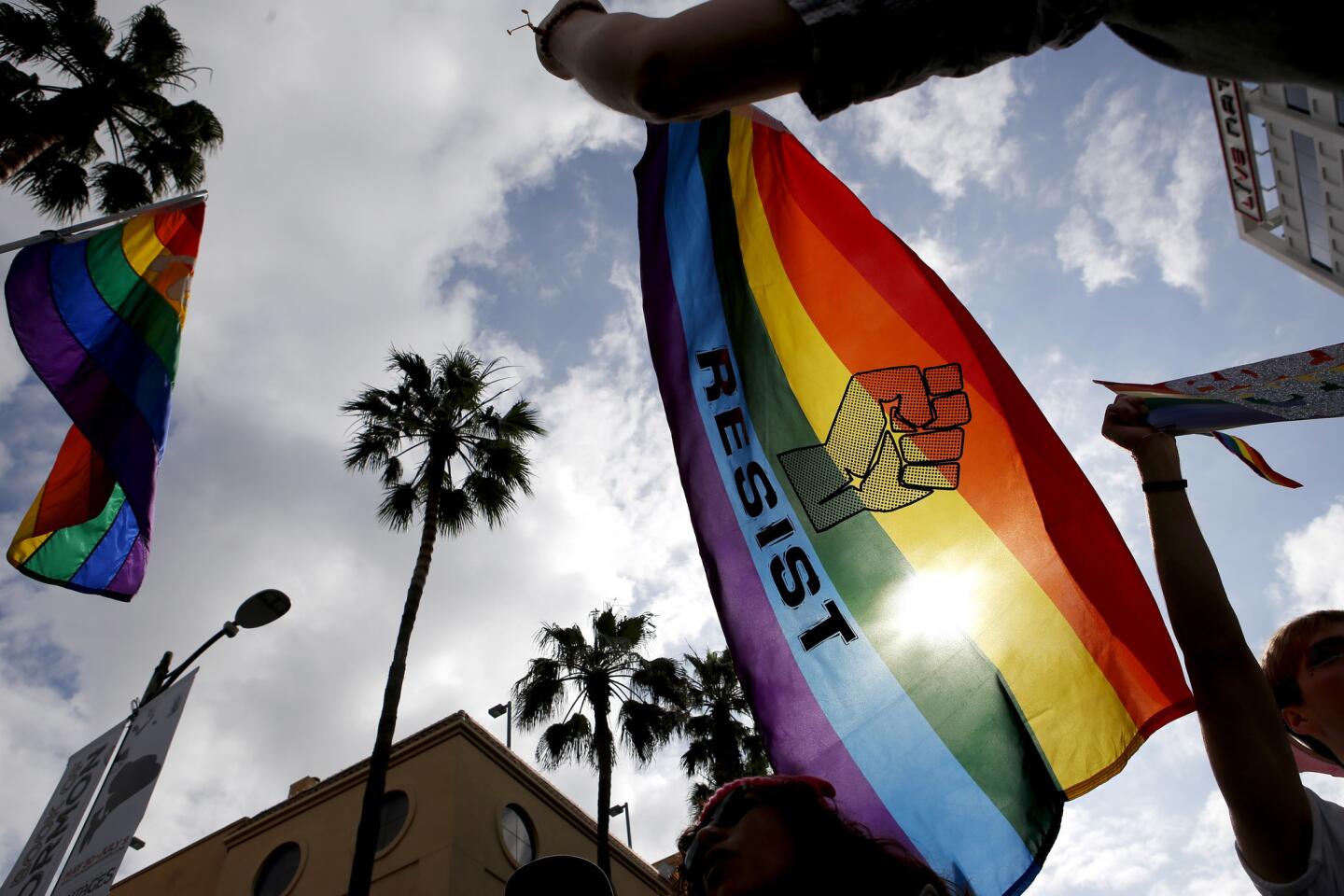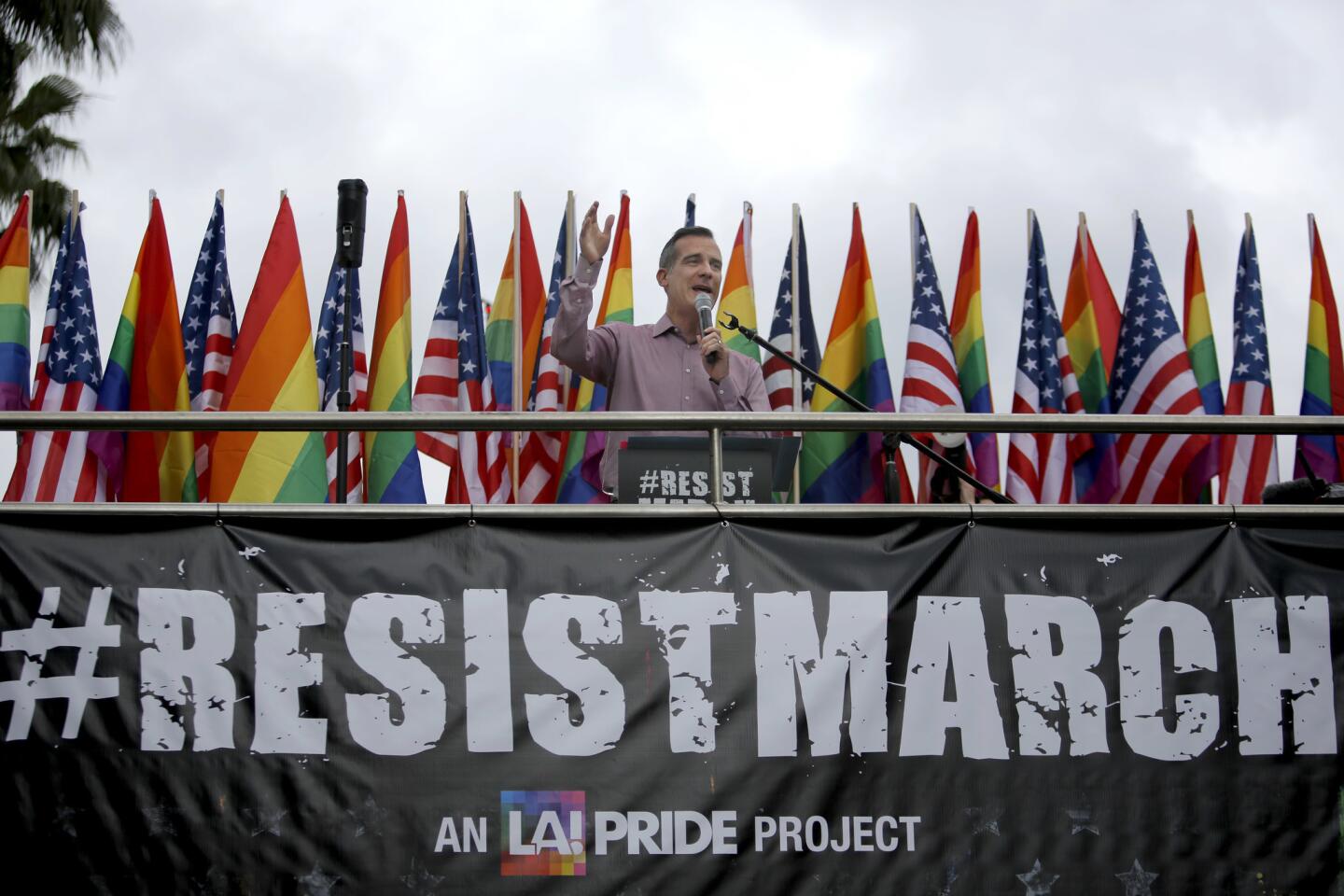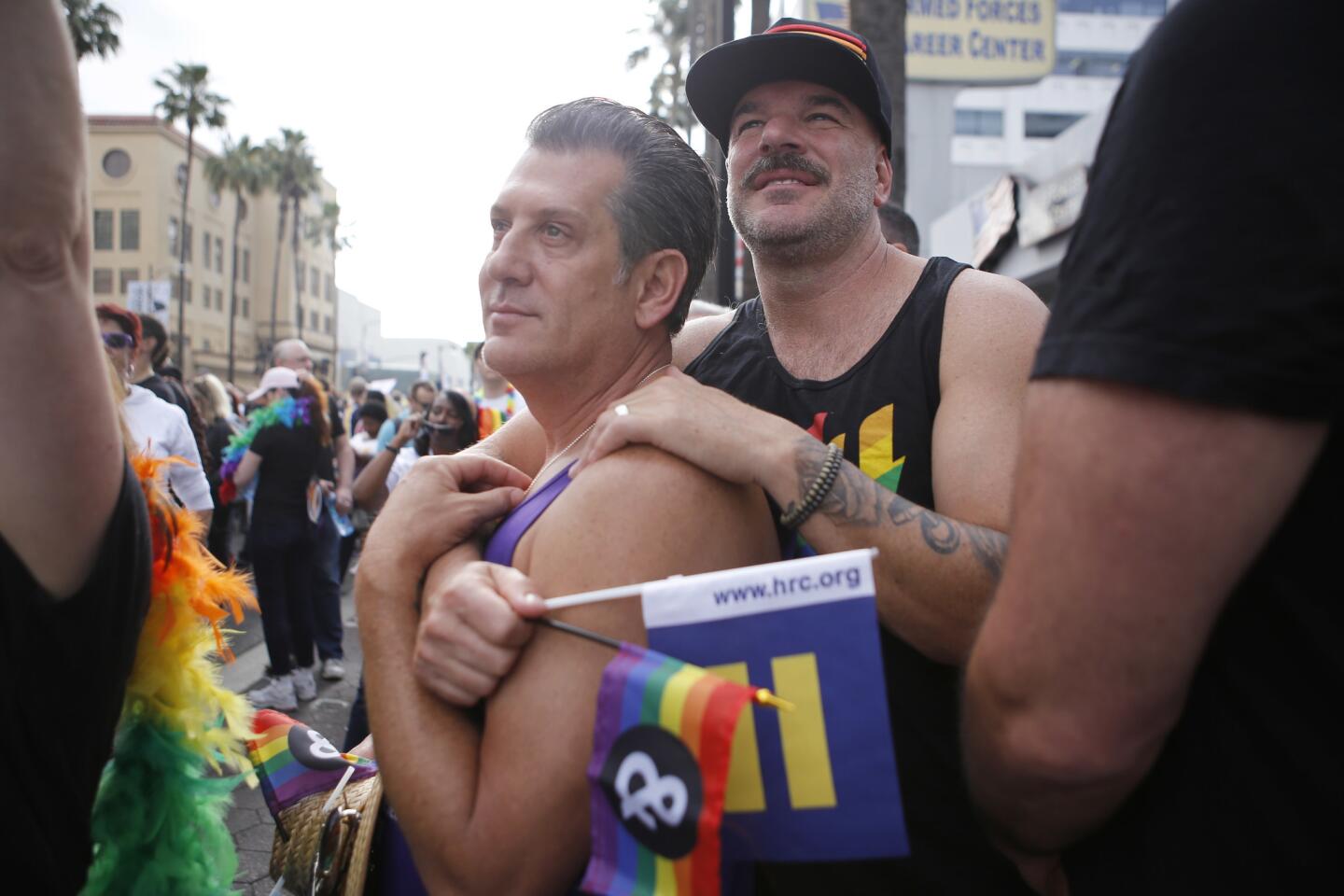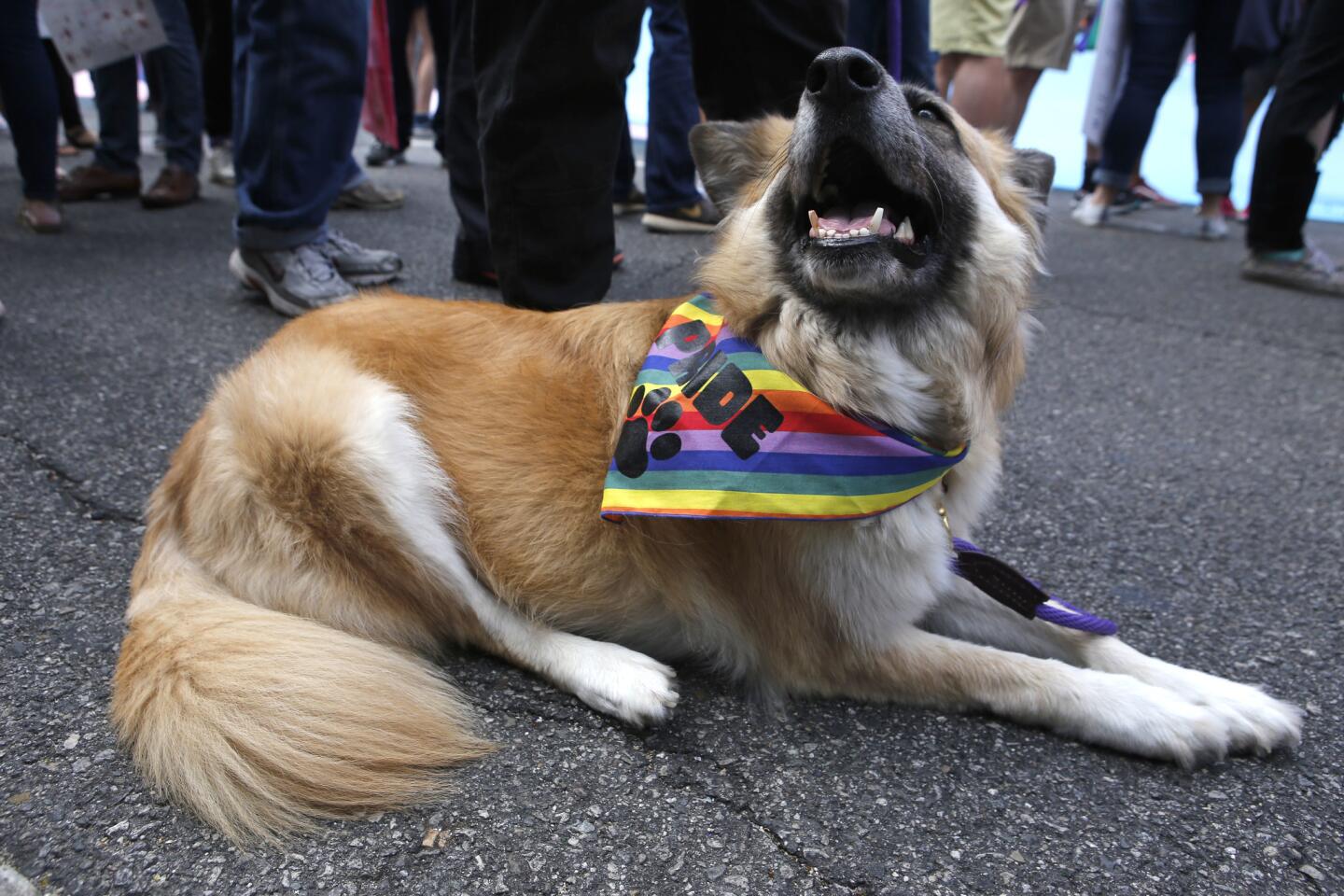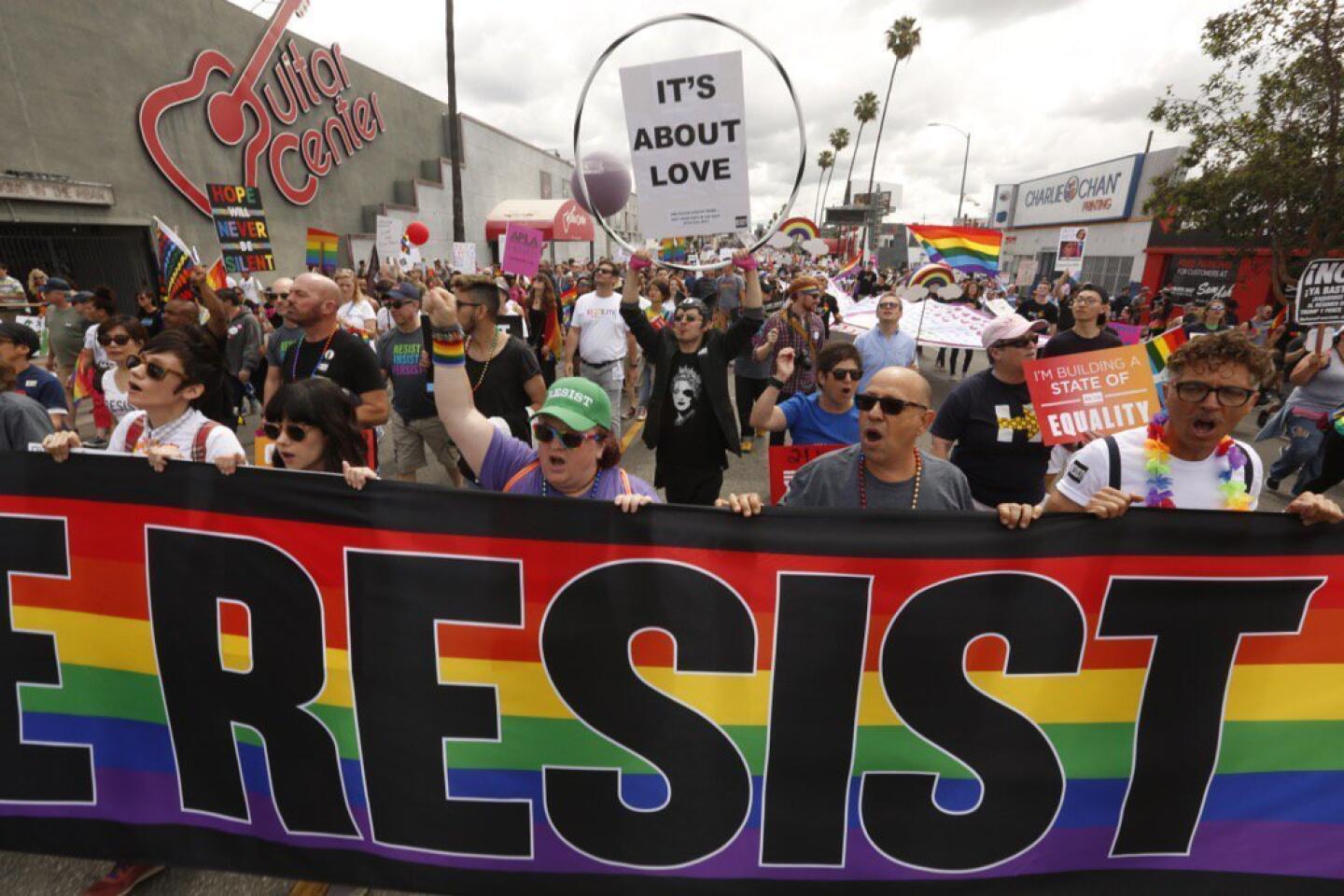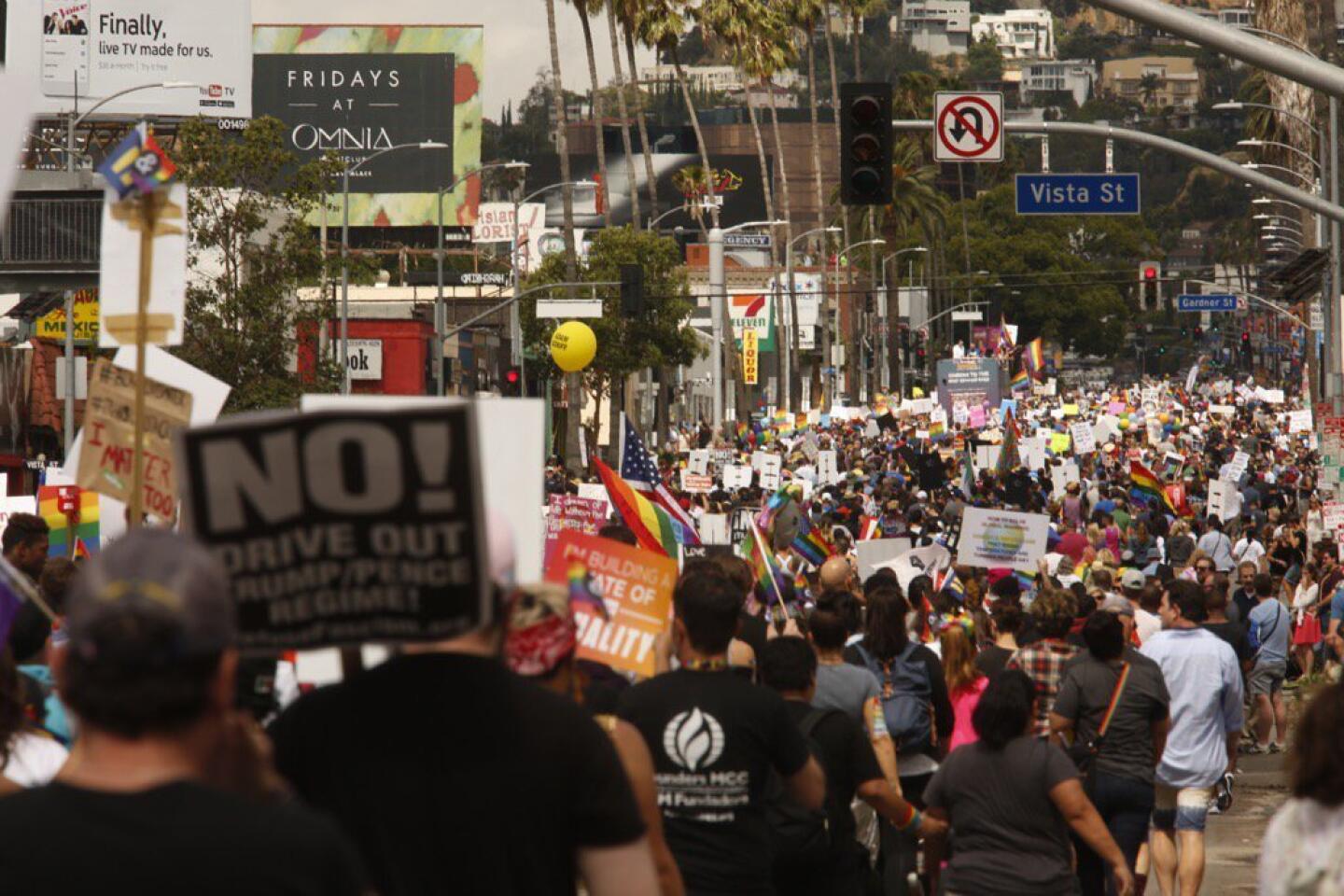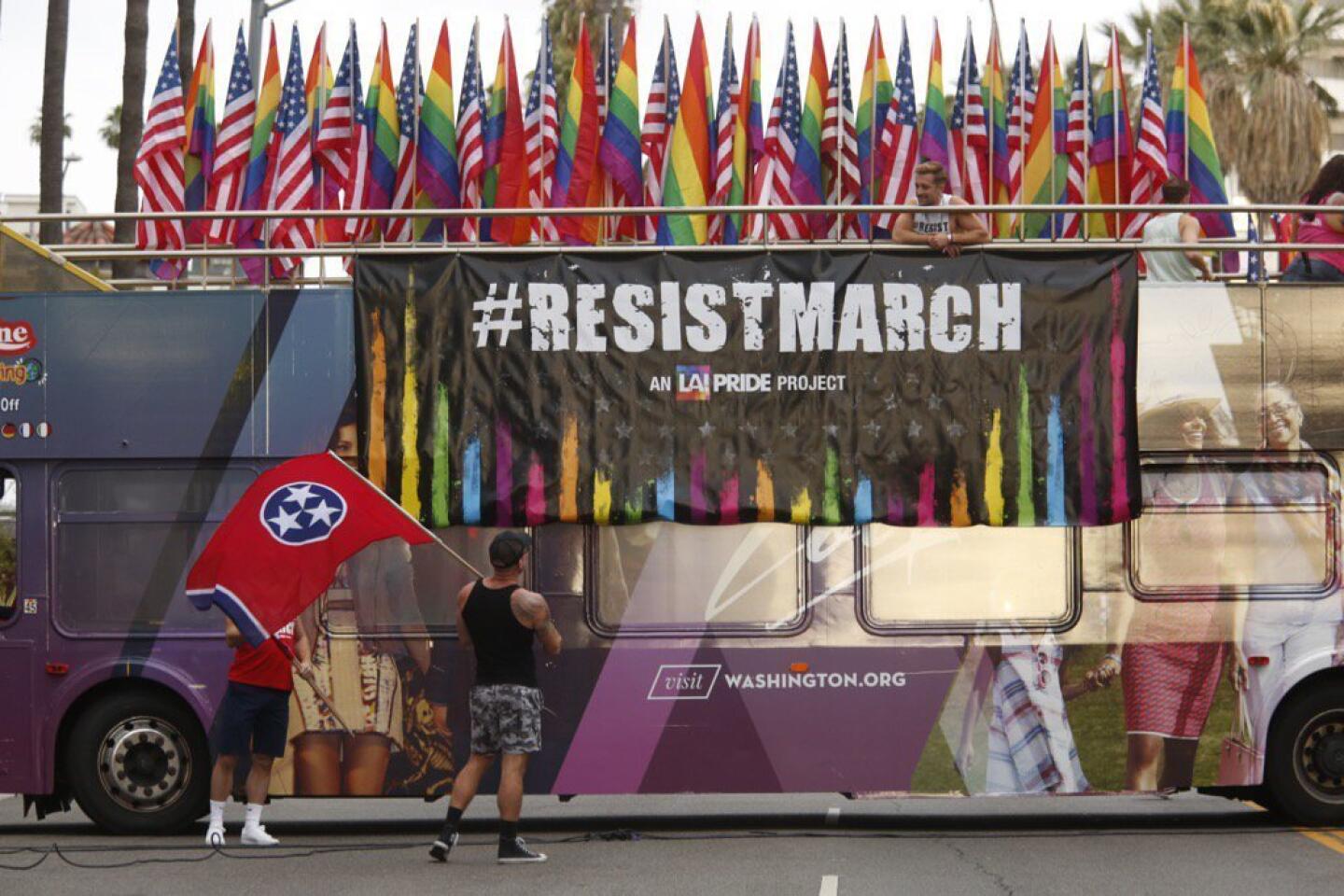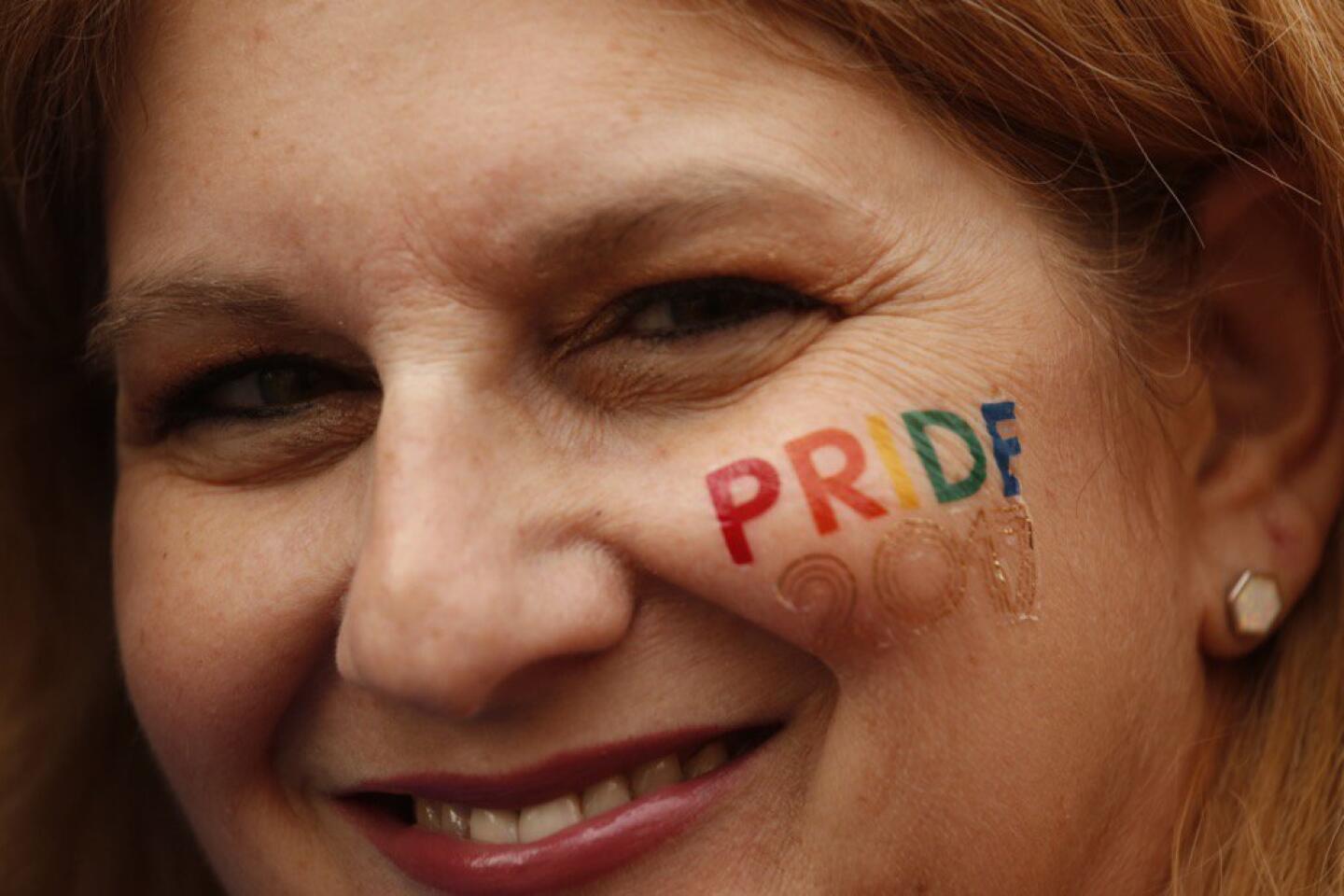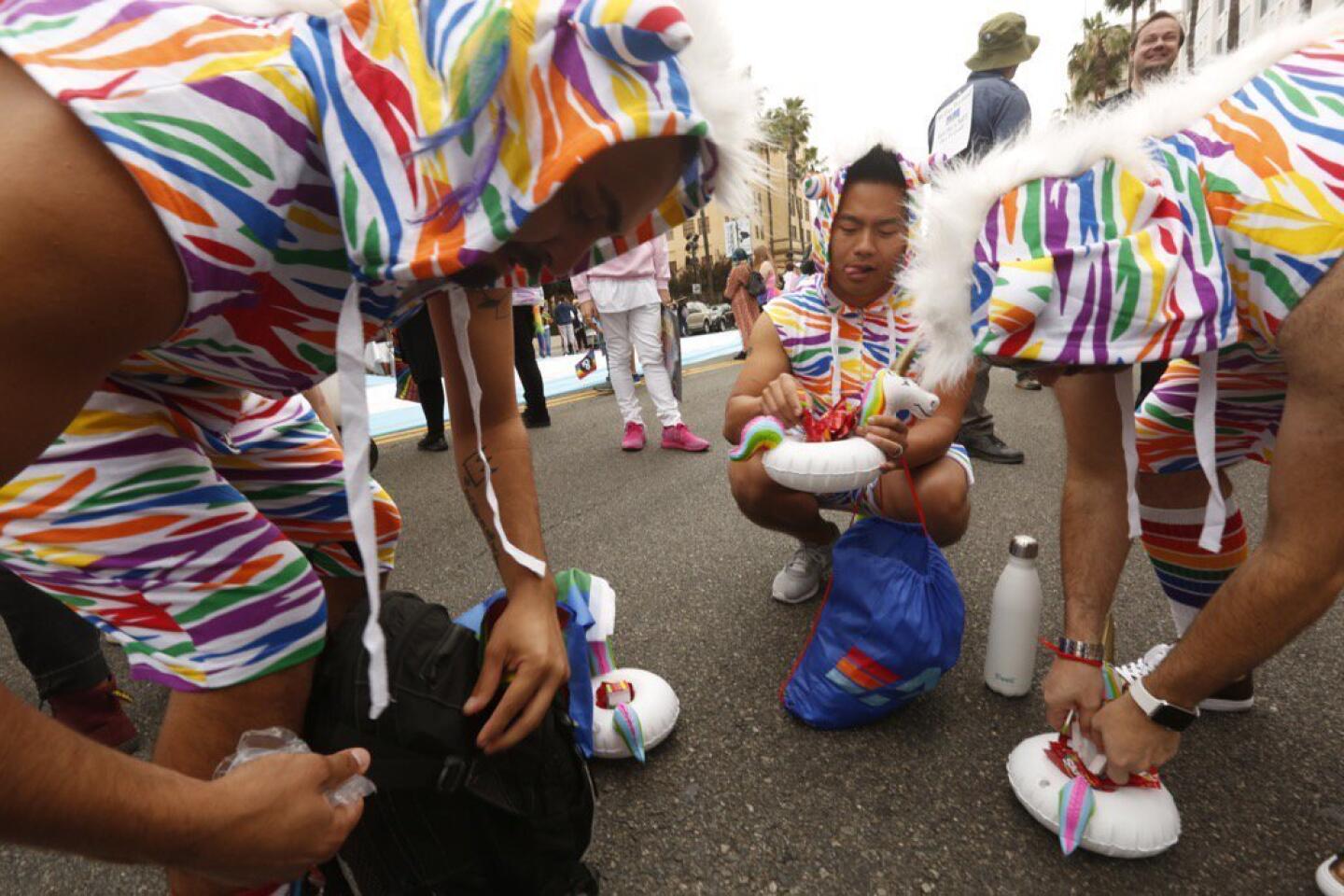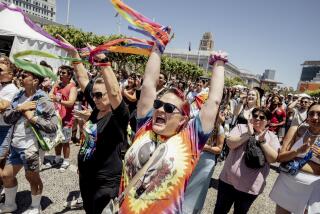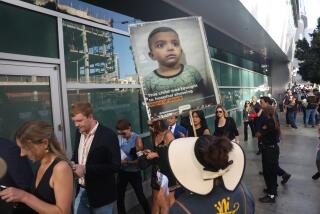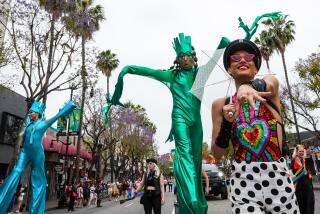L.A. Pride parade morphs into #ResistMarch, as tens of thousands hit the streets

Thousands gathered at Hollywood and Highland to march for LGBTQ rights, and against government forces that would take away human rights. (Video by Claire Hannah Collins / Los Angeles Times)
Edward Gould, 48, and his boyfriend, Bradley Land, 52, wore red shirts with white letters emblazoned with the maxim: “Make America Gay Again,” a riff on President Trump’s campaign slogan.
The Pasadena couple were among thousands of people who filled the streets of Hollywood and West Hollywood on Sunday to participate in a human rights march that this year replaced the historic L.A. Pride parade.
Gould and Land said the march was more appropriate given the political climate.
“The assault on minorities and marginalized communities in this country is unacceptable,” Land said.
Follow our live coverage of the L.A. Pride #ResistMarch »
The parade has long been a bellwether of the LGBTQ community’s heartaches and victories, from the AIDS crisis to same-sex marriage. From the first parade in 1970 — which the city’s Police Commission tried to stop, warning that participants could be assaulted — it evolved into a colorful, festive event that celebrated the lesbian, gay, bisexual, transgender and queer communities.
But on Sunday, the parade was replaced with what can best be described as a symbol of the Trump era — a protest march, complete with a hashtag in its name: the #ResistMarch.
“This year, the LGBTQ community is lending our iconic rainbow flag to anyone who feels like their rights are under threat and to anyone who feels like America’s strength is its diversity,” said Brian Pendleton, who organized the march. “The political climate we find ourselves in has driven us to galvanize and unite.”
This #ResistMarch, Pendleton said, was inspired by the massive women’s marches that took place the day after President Trump’s inauguration in January. People felt the need to make a statement that “we will resist being driven back into the closet by regressive policies,” he said.
On Sunday, a giant pink, blue and white transgender flag was stretched across Hollywood Boulevard.
Kassandra La Giusa-Riedeman and her mother Jacki Riedeman marched with one of 49 giant purple balloons that were meant to honor the victims of the mass shooting at the Pulse gay nightclub in Orlando in 2016.
Kassandra, a 21-year-old student at CSU Channel Islands, grew up coming to the Pride parades with Riedeman and her wife, and Kassandra wore a button that said “I (Heart) My Moms.”
She described herself as a straight ally. She said her boyfriend had been concerned about the march after last year’s Orlando shooting and asked, “Are you sure you want to go? What if something happens?”
But Kassandra said she wouldn’t have missed it. She and her mother weren’t sure what to expect with the march and were concerned that not as many people would turn out because the parade was gone. But they were thrilled with the size of the crowd.
Kassandra said that, carrying the purple balloon, she could “feel the weight of the loss.” The Orlando victims were on her mind, she said.
Riedeman said she’s been with her wife for about three decades and said it’s surreal to be here with her daughter as a young adult. They brought her to Pride parades as a baby.
She said that things felt so positive after the Supreme Court ruled on same-sex marriage a few years ago but that she worried the community would become complacent since they made so much progress so quickly.
Riederman didn’t feel that way Sunday. The current political climate, she said, “will jumpstart the movement again.”
The large crowd, which stretched for blocks, was mostly orderly and police reported no major problems or arrests.
As the march turned into West Hollywood on Santa Monica Boulevard, marchers passed Russian bakeries and pharmacies and Cyrillic writing on buildings — from the city’s large Russian population. In the crowd, signs with Trump’s face read: “Making Russia Great Again.”
The crowd chanted “Black Lives Matter” and “When women’s rights are under attack, what do we do? Stand up fight back! When immigrant rights are under attack, what do we do? Stand up, fight back! When trans rights are under attack, what do we do? Stand up, fight back!”
James Lewis Perdue Jackson II isn’t new to protest marches. He walked in the city’s first Pride march in 1970, a time, he said, when the participants were “more anarchist” and “more destructive.”
They had to be, Jackson said. The LGBTQ community had experienced police brutality, and the march itself was controversial because police warned of potential violence against participants.
Those were the days, the 71-year-old said, when he sang in gay clubs and listened to Motown. He cited Marvin Gaye’s song “What’s Going on?” as an inspiration to take action in support of people of color and LGBTQ people, like himself.
“We’ve been in this fight a long time,” Jackson said.
Sam Burdick-Morris, 13, came out as a gay youth a few months ago and marched Sunday with his mother, Anne Burdick. Wearing a shirt that read “Proud to Be Gay” in pink letters, and with a rainbow flag wrapped around his neck, Burdick-Morris said he felt “really, really happy.”
“There is such a big community and unity here,” the middle school student said, smiling.
His mother, wearing cat ears, beamed beside him. She said she was proud that a 13-year-old like her son could feel comfortable coming out, and she was marching to support young people.
“This march is for them,” she said.
Disabled and wheelchair-bound, Stephen Sadler was unable to march Sunday but he was in good spirits as the crowd cheered as a group of musicians marched across Santa Monica Boulevard and Fairfax Avenue.
“I think everybody should live in peace — the gay people deserve it for their contributions and for how they built up West Hollywood so awesome. We all live here because it is safe,” said Sadler, who has lived in the city for the last five years.
Sadler said hopes the big turnout Sunday will convince President Trump to pay more attention to the LGBTQ community.
“If Trump is a Christian, he should treat us all equally,” he said. “Work together knowing that we’re in it together; we all bleed the same blood.”
Nina Firooz, 31, and her roommate Cher Heath, 30, wore black T-shirts with the words “Jesus Resisted” in rainbow-colored letters. They were attending the march with members of InVision Church in North Hollywood. Coming to the march, they said, was in essence their Sunday service.
Firooz said that was appropriate because “if you look biblically, you can see many examples where Jesus resisted the status quo. He helped women when it wasn’t OK. He helped everyone. We love everyone too. Our world’s better when we love.”
Firooz said she was deeply moved by the march starting at Hollywood and Highland, where the first parade in 1970 kicked off.
“This is what pride was originally about,” she said. “We’re getting back to our roots.”
Firooz said she’s frustrated by the rhetoric of the Trump administration and worries about her rights and the rights of the LGBTQ community and others being rolled back. It’s been a long, emotional six months for her. Her parents are from Iran, and she has worried for them too.
“I am a queer Iranian woman in the Trump era,” Firooz said. “He really doesn’t like me. It’s not a partisan issue for me. It’s how Trump treats people.”
She said Sunday’s march is for anyone who wants to stand up for human rights.
“It feels like a covering, the rainbow flag. It’s for everyone.”
Marna Deitch didn’t walk in Sunday’s demonstration but instead rode her motorcycle.
The 59-year-old motorcycle instructor organized a motorcycle brigade to lead the protest march. Though she isn’t sure how many motorcyclists will join--dozens lined up on La Brea Boulevard before the march--Deitch hopes people will “hear the engines in D.C.”
Wearing a black vest studded with pins and standing next to her bike, covered with colorful stickers with hashtags like “#I resist misogyny” and “#I resist homophobia,” Deitch said this is not a year to “have fun” at the parade. Deitch, who had ridden her motorcycle in Pride parades for decades, said she was at the march to protest.
Deitch planned to lead the brigade, with a gay man riding on the back of her motorcycle, a straight couple next to them, and a transgender couple nearby, along with others, in a symbolic showing of equality, she said.
Joey Valadez, 34, has participated in previous Pride parades but he said he believed Sunday’s march was a more appropriate way for the community to express its political concerns.
“Parades can be overrated if they only expose the gay community to be about partying. I’m glad that there’s a march, that there’s a strong opportunity to send a message that it should be about unity — about equality for all, regardless of what you choose,” Valadez said, clutching a rainbow-colored flag.
Organizers said the march gets back to the roots of the original parade, which was organized to commemorate the one-year anniversary of the uprising at the Stonewall Inn in New York City in 1969 and to publicly acknowledge the growing LGBTQ rights movement.
Like this year’s march, the first parade started at the intersection of Hollywood Boulevard and Highland Avenue in the city of Los Angeles. In later years, L.A. Pride would take place entirely in West Hollywood.
A long list of special guests — including U.S. House Democratic leader Nancy Pelosi, Rep. Adam Schiff (D-Burbank) and Rep. Maxine Waters (D-Los Angeles) — spoke at the end of the march, near West Hollywood Park.
Donning rainbow-colored clothing, the speakers condemned Trump’s actions toward women, Muslims, and Latinos, and also criticized his policy stances on climate change and healthcare. Waters called for the president’s impeachment.
Schiff spoke first, saying Trump lacked “basic human decency.” He spoke of his pride for LGBTQ people who for years have gathered in West Hollywood for the annual parade, but noted that this march was different.
“This year we are proud as ever, but we are also mad as hell,” Schiff said.
Pelosi called on marchers to amend and expand the Civil Rights Act of 1964 with the Equality Act, a bill aimed at ending discrimination against LGBTQ Americans.
“Every step we take forward to end discrimination in our country is a patriotic act,” Pelosi said.
Twitter: @haileybranson
ALSO
LAX pylons light up like a rainbow for LA Pride weekend
The Babadook as an LGBT icon makes sense. No, really
Rams, Chargers reach out to LGBTQ community with sponsorship of Venice Pride
UPDATES:
12:15 p.m.: This story has been updated with more details from the scene.
11:10 a.m.: This article has been update with more interviews with participants.
10:25 a.m.: This story has been updated with more details from the scene.
9:30 a.m.: This article has been updated with more interviews with demonstrators.
9:05 a.m.: This story was updated with more comments from participants.
8:10 a.m.: This story was updated with comments from march participants.
This story was originally posted at 5 a.m.
More to Read
Sign up for Essential California
The most important California stories and recommendations in your inbox every morning.
You may occasionally receive promotional content from the Los Angeles Times.
